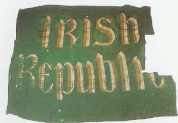In light of the re-emergence in Ireland of The Risen People – finally driven to rebel not just against the unjust water tax but by relentless austerity, authoritarian rule and rampant corruption among the political class, I think it is appropriate to publish a recently discovered piece written in 1969 by my father, Pearse. It will demonstrate how much of a circle game life can be if underlying problems are not dealt with. I know it would do my father’s heart good to see the Irish people come out to take control of their country. If he was still with us he would be at the barricades.
This is what he wrote –
Bernadette [Devlin] has been giving our beloved establishment a rather thin time. She doesn’t seem to realise fully just how firmly based our institutions really are. After all, our conservatives scored heavily in the last general election. The good old profit motive was fully endorsed by the electorate. The remnants of the Irish race, left here at home prefer to lie down, and be counted-out. We have lost faith in ourselves, and God seems to be on the side of the stronger battalions.
Bernadette is quite wrong to equate our gentle whimsical green Tories with the tough, die hard bull Tories of merry England, such as Sir Gerald Nabarro and his ilk. To be quite fair to our own dear Tories, they would all be socialists only for what happened to them – they were born lucky, and got rich. There’s the difference.
Bernadette’s abrasiveness is wasted on our smooth operators down here. Of course, they may only be pretending to be Tories, because any leftish tendencies, any slight list to port might result in the offender getting a ‘belt of a crozier’ to steady him up. A wise statesman plays it cool because he knows the score. It’s like this:
In the beginning God made a long red carpet, and rolled it out to infinity across the good flat earth, and He said, ‘Let there be kings’. And lo, there were kings. There were fat kings and thin. Tall and short kings. Foolish kings and wise ones. Kings white and black and all shades between. Kings good, and kings evil. Oodles of kings and all equally invested with divine rights, all trooping down the red carpet in endless succession, by the Grace of God.
They came with all their retinues in gorgeous array. Princes and Prelates, Dukes and Earls, Baronets and Knights all duly supporting their divinely accredited monarchs.
All was not exactly rosy on the nice red carpet. Heads rolled in grisly profusion. Crowned heads, heads with coronets, mitred heads, and plain ordinary swelled heads. No king on record lasted long without his head. That was a fact of life, divine rights notwithstanding. The natural order was preserved – the survival of the fittest and all that. A bit messy, but no hard feelings. ‘The King is dead, long live the King’, and that sort of thing.
At some stage of the game the supply of kings started to dwindle. This was only to be expected. The royal mortality rate was rather high, due to one occupational hazard or another. Only a fool would want to be a king who wasn’t actually born with a crown on his head.
The kings in their heyday were very partial to a well-filled stocking, and they had lots of leisure, with predictable results. They say the Hapsburg chin was discernable in the most unexpected corners, for instance. There was no formal study of genetics in those days of course, but we know that the cutest hen lays out. This is where the hard-line Tories come from.
Wealth and power was a reasonable substitute for a crown especially when the divine right was extended to private property. Anyway there were only a limited number of crowns. The idea was to stay put on the red carpet with all those solid churchmen – to play it safe in saecula saeculorum Amen. Official Tory policy.
Suddenly, much too close to the red carpet, hordes of unruly peasants and workers appeared, churning up the mud and kicking up a row trying to get onto the plush. Couldn’t the damn fools see that there simply wasn’t enough room? By Gad, sir, the cheek of them, all swinish anarchists and socialists, fighting each other and everyone else.
Keep back, fools! Back to your places. Be content. It’s not for long anyway and there’s pie in the sky for sure.
Preach to them, Bish. Tell them they’ve never had it so good. Think of something quick. Tell them God is on our side. Tell them its a sin. Get through to them Bish, for heaven’s sake or we’ll all be dished.
Look at the silly bastards trampling each other in the mud, and blood. Serves them damn well right. Steady boys steady. Press on regardless and show no mercy. We can’t have millions of stupid clods getting mud all over the bloody carpet.
Oh to Hell with it all, there’s too many of them. They’re everywhere. Press the button. Finish the lot. It could never be the same again anyway.
Pearse Stokes
16th December 1969
